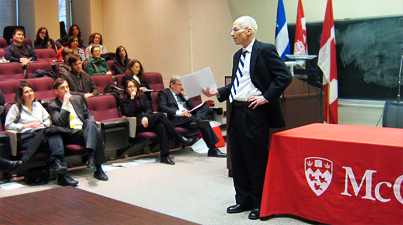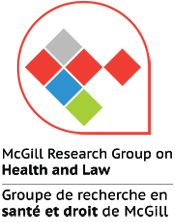2023 Annual Lecture: “Tomorrow’s Biolaw: Judicial Plasticity and Digital Complexity?”
Presented by Dr. Bartha Maria Knoppers, full professor, Canadian Research Chair in Law and Medicine, and Director of the Centre of Genomics and Policy, on Thursday, January 19, 2023 4:15-5:45PM EST, Moot Court (NCDH Room 100), 3660 Peel Street.

From the Hippocratic oath to the Nuremberg Code, the Declaration of Helsinki, and the Universal Declaration on Bioethics and Human Rights, biomedical advances have been filtered through and interpreted against these ethical norms. Moreover, the focus of scientific research has moved beyond individuals, clinical trials, and rare diseases to also include whole populations and communities under the banner of serving group interests and to better understand the evolution and future our human species. Citizens are being asked to contribute to ongoing international mapping of the human genome, to national biobanks and population studies that serve as resources for future unspecified research for others. Indeed, alongside traditional discovery science has emerged a new infrastructure science. Yet, also percolating are bioengineering, gene editing and regenerative medicine efforts that challenge classical legal dualisms and divides such as person-property, animal-human, or living-dead. How plastic is or will be the framing of the “legal” human?
Parallel to the legal challenges raised by this new biology and infrastructure science are those of information technologies and their ensuing probabilistic, digital complexity. Stratification based on population data may well serve to ensure targeted resource allocation and thus rescue the ongoing sustainability of our universal health care systems, but currently, the use of polygenic risk scores may be misleading. Moreover, treatments, drugs and devices premised on databases that are not representative of different ancestries and of human diversity are equally harmful. Contribution by all citizens to variant databases is essential to their use in diagnoses and interpretation but where and on whom does the responsibility to contribute one’s health data to ensure quality and safety lie? Quid, the algorithms that feed m-health and medical devices? Finally, clinical genomic testing is already in use in the health care setting in some countries but raises the issue of potential duties to family members and data privacy and confidentiality. Data may be the new prevention, the new treatment, but can we accept its dynamic, complex and “epigenetic” nature?

Dr. Bartha Maria Knoppers, PhD (Comparative Medical Law) is Full Professor, Canada Research Chair in Law and Medicine, Director of the Centre of Genomics and Policy, Faculty of Medicine and Health Sciences at McGill University. She was the Chair of the Ethics and Governance Committee of the International Cancer Genome Consortium (2009-2017) and Co-Chair of the Regulatory and Ethics Workstream of the Global Alliance for Genomics and Health (2013-2019). She also helped draft the OECD Recommendation on Health Data Governance (2017), was appointed to the International Commission on the Clinical Use of Human Germline Genome Editing (2020), and currently co-chairs the Ethics Working Group of the Human Cell Atlas (2018-2022). She holds four Doctorates Honoris Causa and is a Fellow of the AAAS, the Hastings Center of Bioethics, the Canadian Academy Health Sciences and the Royal Society of Canada. She is an Officer of the Order of Canada and of Quebec, and recipient of the Henry G. Friesen International Prize in Health Research (2019), the Till and McCulloch Award for Science Policy (2020) and the Lifetime Achievement Award, Canadian Bioethics Society (2021).
The Intersect of Health and the Law: An Indigenous Journey - RGHL annual lecture with Senator Yvonne Boyer
15 September 2021, 16:00 to 18:00, Maxell Cohen Moot Court / online
Le 15 septembre dernier, la sénatrice Yvonne Boyer a donné la conférence annuelle du Groupe de recherche en Santé et droit dans un format virtuel-hybride, depuis le tribunal-école de la Faculté de droit de McGill.
Lors de cette présentation éducative et inspirante, Madame Boyer a discuté de sa recherche sur la stérilisation forcée des femmes autochtones, ainsi que ses efforts en tant que sénatrice pour mettre fin à cette pratique inhumaine. Elle a aussi partagé comment son expérience et celle de ses proches, en tant que femmes métis, influencent son approche à la santé, au droit, et à leur intersection.
Merci à notre auditoire de s'être joint à nous!
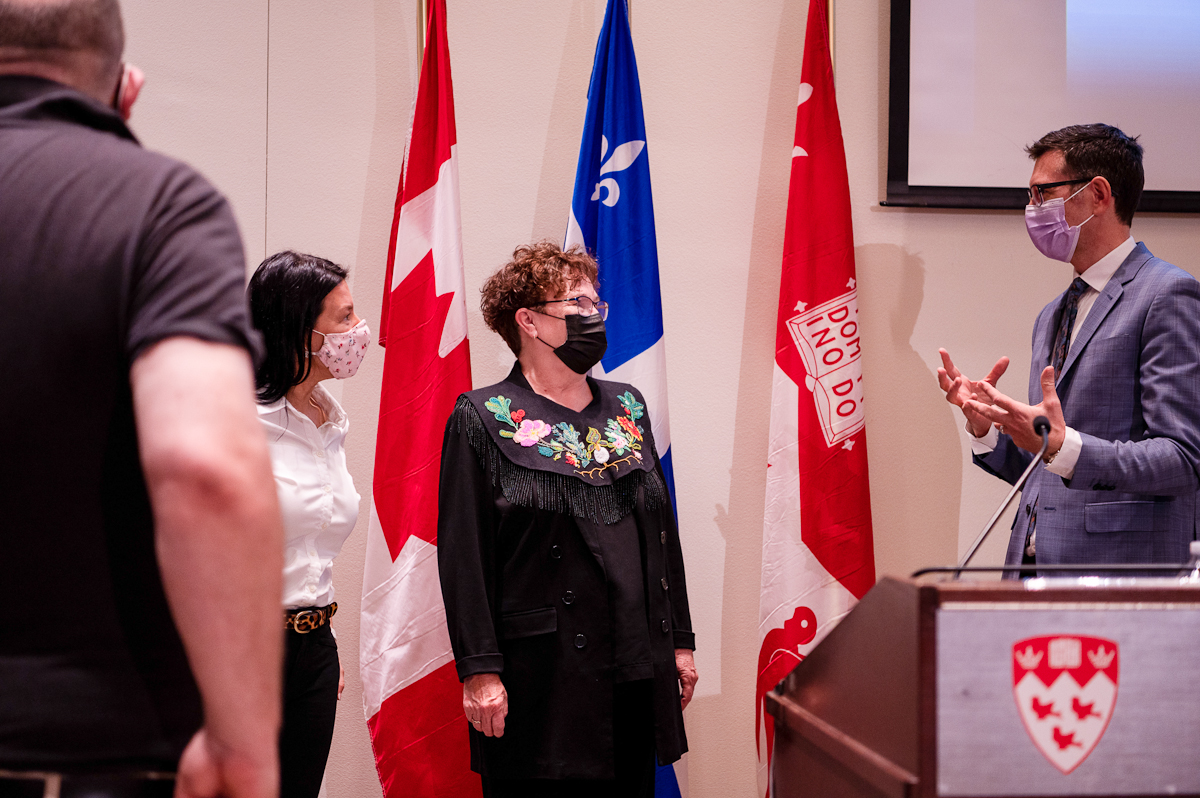
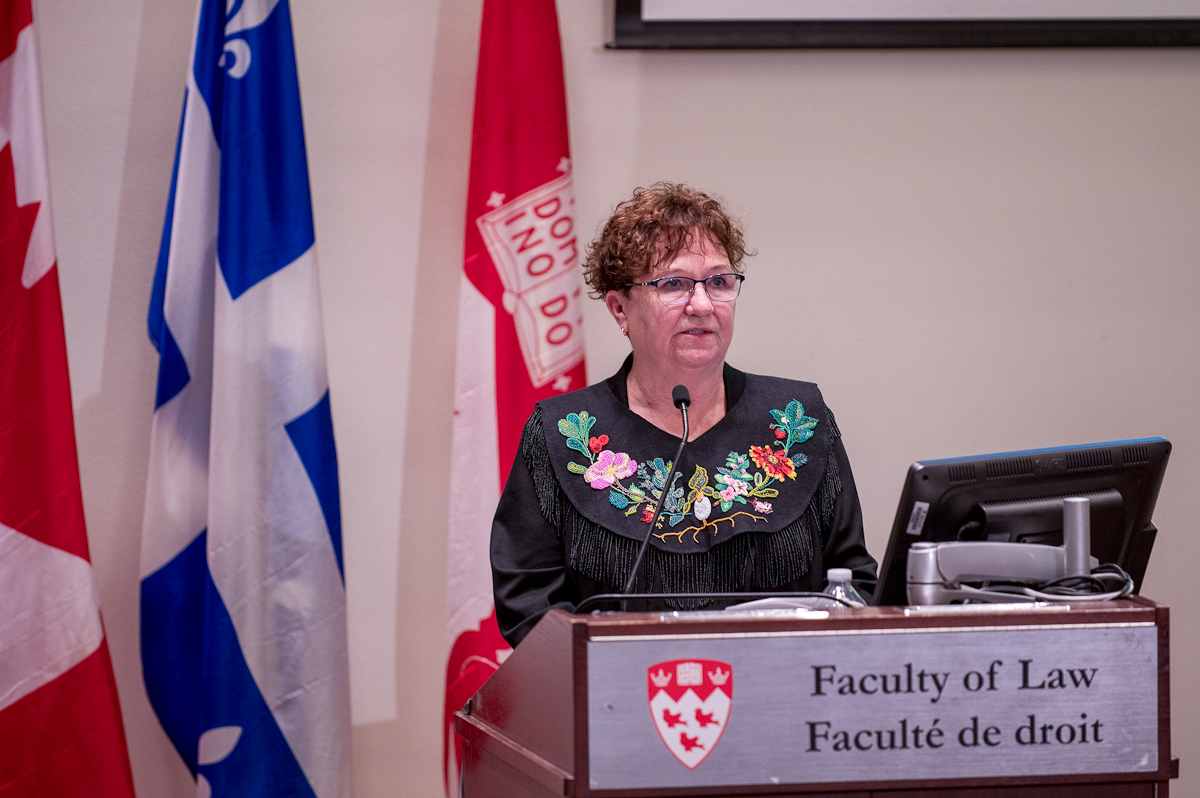
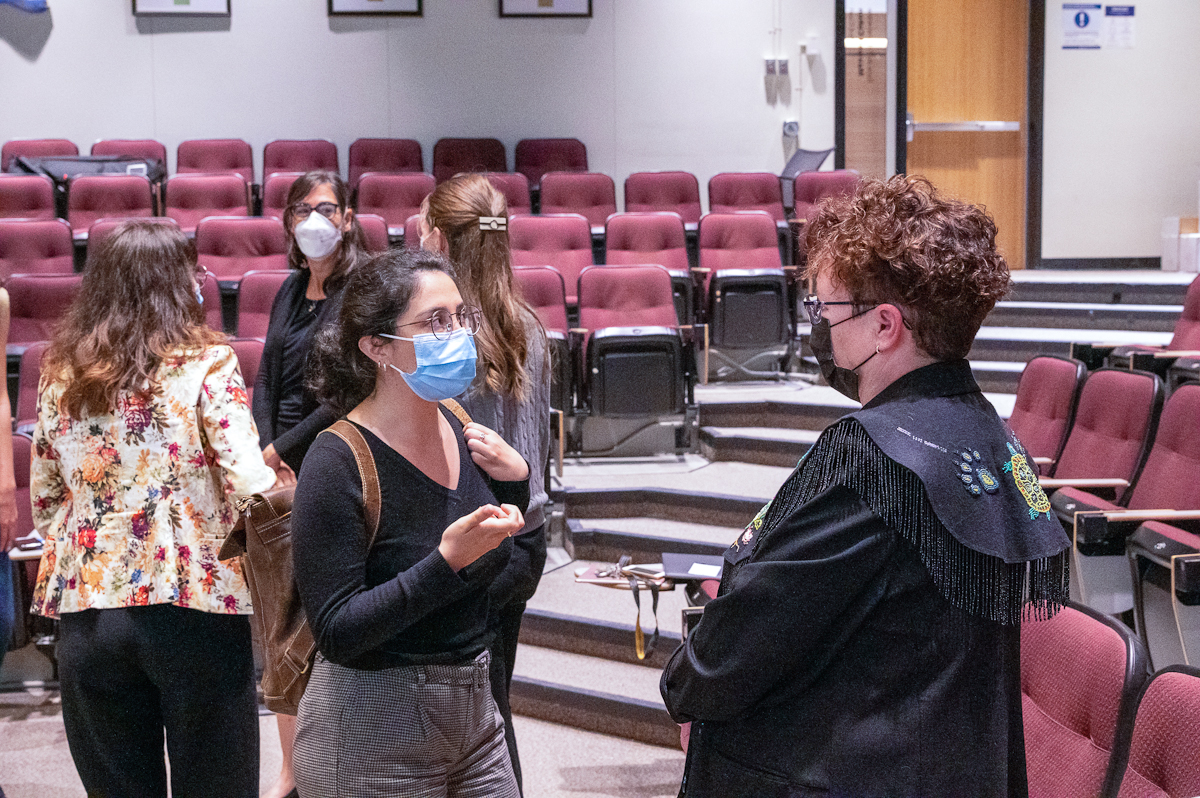
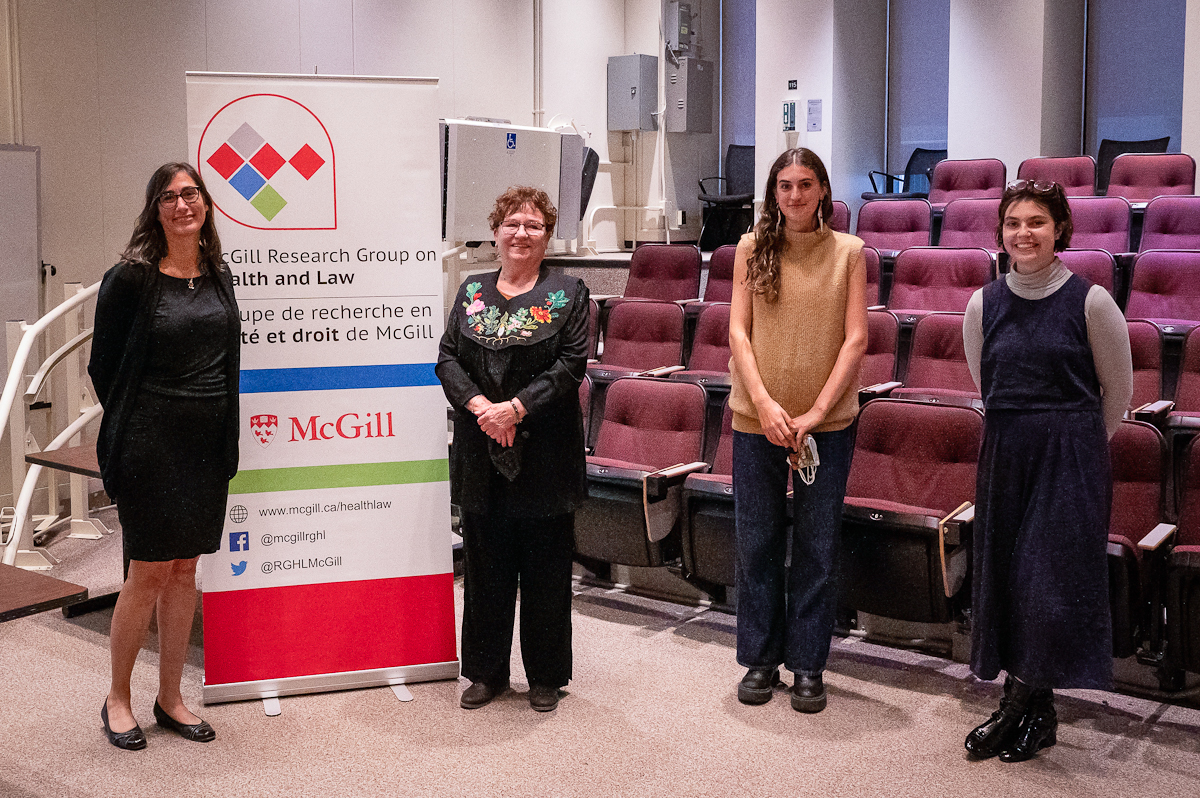
Brain Injuries in Sports: from Awareness to Action
15 January 2020, 13h-14h30, New Chancellor Day Hall, Maxwell Cohen Moot Court
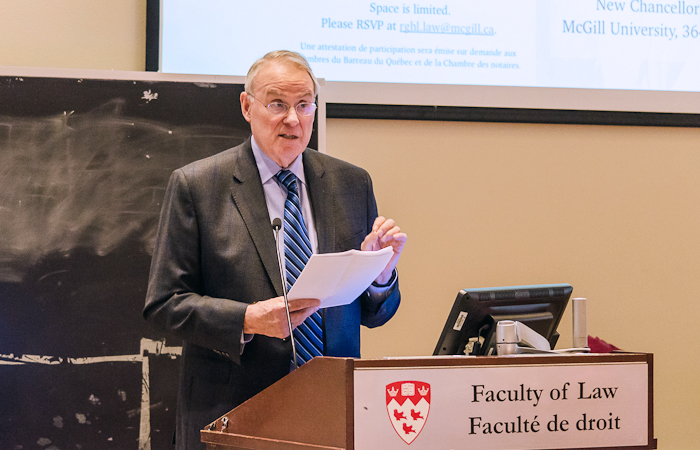
Le 15 janvier dernier, plus d’une centaine de membres de la communauté mcgilloise et de la communauté juridique ont participé à notre conférence annuelle.
Ken Dryden (LLB'73), lawyer, former member of Parliament, and former goalie of the Montreal Canadiens shared his thoughts on the role of the law in preventing brain injuries in sports. Drawing from his personal experience, he explained why and how we could influence current practices and regulations in sports. He concluded his presentation with the message that it is more important for us to be focusing on preventing this type of injury, rather than developing better diagnosis and treatment tools.
Thank you, Mr. Dryden, for a presentation that was greatly appreciated by the large audience!
Pills for Prejudice: Implicit Bias and the Perils of Biologizing Racism
24 October 2018, 16h30-18h, Maxwell Cohen Moot Court
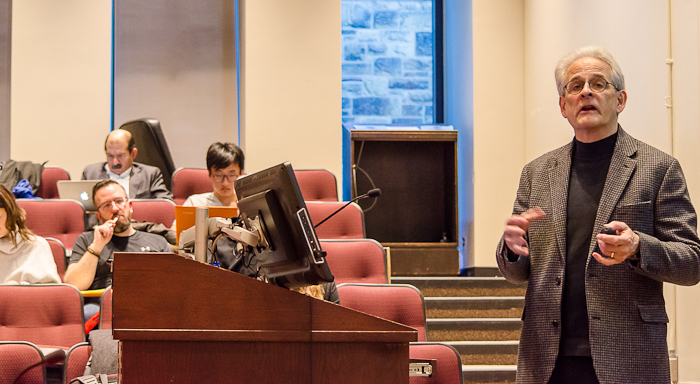
The McGill Research Group on Health and Law was pleased to host Jonathan Kahn, Professor of Law at the Mitchell Hamline School of Law, for its Annual Lecture. His talk, entitled Pills for Prejudice: Implicit Bias and the Perils of Biologizing Racism, critically evaluated trends that may reduce understandings of racism to a mere biological phenomenon of mental health to be addressed primarily through individualized biomedical interventions – rather than as a social problem for which the entire polity bears responsibility.
About the speaker
Jonathan Kahn is the James E. Kelley Professor of Law at the Mitchell Hamline School of Law. He holds a Ph.D. in U.S. History from Cornell University and a J.D. from the Boalt Hall School of Law, U. of California, Berkeley. His current research focuses on the intersections of law and biotechnology, with particular attention to how regulatory mandates intersect with scientific, clinical and commercial practice in producing legal understandings of race and racism in American society. He is the author of Race in a Bottle: The Story of BiDil and Racialized Medicine in a Post-Genomic Age (Columbia University Press, 2012). His newest book is Race on the Brain: What Implicit Bias Gets Wrong About the Struggle for Racial Justice (Columbia University Press, 2018).
La gestation pour autrui et ses implications en droit belge: De la pratique actuelle vers un éventuel encadrement légal?
28 mars 2017, 16h15-18h15, NCDH 312

La conférence annuelle du GRSD sur la santé et le droit, coorganisée cette année avec la Chaire de recherche du Canada sur la culture collaborative en droit et en politique de la santé à l'Université de Montréal, a été prononcée par Geneviève Schamps, Professeure à l’Université catholique de Louvain (Belgique).
Résumé
Depuis plusieurs années, la gestation pour autrui fait l’objet de discussions au sein de la société belge. Sans être interdite ou expressément autorisée par le législateur, elle est pratiquée en Belgique et des Belges y ont également recours à l’étranger. Même si une législation fédérale régit les activités de procréation médicalement assistée, dont le don de gamètes ou d’embryons surnuméraires, des incertitudes juridiques existent dans le cadre de la gestation pour autrui.
Dans la dernière décennie, un grand nombre de propositions de loi ont été déposées, dans le sens d’une autorisation de la gestation pour autrui, accompagnée d’une interdiction de la commercialisation ou de l’intermédiation. Les modalités des réglementations proposées varient toutefois selon les textes. Lire la suite...
Fetal Alcohol Spectrum Disorder and the Courts: a Failure of Access to Real Justice for People with Severe Disabilities
2 février 2016, 16h15-18h15, Salle du Tribunal-école Maxwell-Cohen (NCDH 100)
Le Groupe de recherche en santé et droit accueillait l'honourable Ian Binnie, qui nous a entretenu sur les préjugés juridiques rencontrés par les personnes souffrant de troubles causés par l'alcoolisation fœtale (ETCAF).
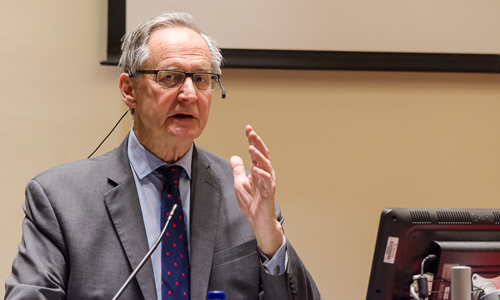
Abstract
Fetal Alcohol Spectrum Disorder (FASD) covers a range of disabilities caused by pre-natal exposure to alcohol. Its effects can include severe cognitive and behavioural deficits that surface not only in criminal proceedings but every judicial context from custody disputes to welfare and guardianship. FASD often manifests itself in the inability of victims to organize their lives, control their actions and learn from bad outcomes. Often associated in the media with some aboriginal populations, FASD is in fact estimated to affect 2% to 5% of all newborns in Europe and North America. Much more could be done to alleviate the legal prejudice created by this disability.
The speaker
The Honourable Ian Binnie served for nearly 14 years as a Justice of the Supreme Court of Canada, where he authored over 170 opinions, including leading cases in expert evidence, and many aspects of constitutional, criminal and administrative law.
Prior to his judicial appointment, he served as the Deputy Minister of Justice for the Government of Canada and spent many years in private practice, regularly appearing before the Supreme Court on a range of constitutional, civil and criminal matters. Mr. Binnie was appointed a Companion of the Order of Canada in 2012. He has received the CCLA Civil Liberties Award (2013), the Toronto Lawyers Association's Award of Distinction (2012), and the University of Toronto's Distinguished Alumnus Award (2011).
He is currently a Commissioner at the International Commission of Jurists, chairperson at the Internal Justice Council of the United Nations, and counsel at the Toronto firm Lenczner Slaght Royce Smith Griffin. In 2013, Mr. Binnie chaired the Institute of Health Economics’ first-ever Consensus Development Conference on Legal Issues of Fetal Alcohol Spectrum Disorder (FASD).
How Law Facilitated Pharmaceutical Fraud and How It Could Save Us
Wednesday, February 25, 2015, 16h-18h, Maxwell-Cohen Moot Court (NCDH 100)
 Le Groupe de recherche en santé et droit a l'honneur de vous inviter à sa Conférence 2015 sur la santé et le droit, laquelle sera prononcée cette année par le professeur Trudo Lemmens, titulaire de la Chaire Scholl en droit et politique de la santé à l'Université de Toronto.
Le Groupe de recherche en santé et droit a l'honneur de vous inviter à sa Conférence 2015 sur la santé et le droit, laquelle sera prononcée cette année par le professeur Trudo Lemmens, titulaire de la Chaire Scholl en droit et politique de la santé à l'Université de Toronto.
Abstract
Since Thalidomide, the legal regime introduced to improve pharmaceutical product safety and efficacy has generated new administrative, industrial and scientific practices. These practices, in combination with a host of social, cultural and scientific developments, including the emphasis on evidence-based medicine, have strengthened industry’s grip over pharmaceutical knowledge production. Statutory law and regulation have thereby facilitated fraud and misrepresentation, while industry’s growing control over scientific knowledge has also undermined the integrity of traditional tort mechanisms that could offer compensation to those affected by these practices.
Professor Lemmens discussed these developments and briefly explore the strength and limits of some legal tools aimed at curbing this trend, paying particular attention to recent legal skirmishes related to transparency and access to data. Considering the central role of scientific knowledge and the impact of health care products on physical and mental integrity, he argued that states have a human rights obligation to strengthen independent scientific knowledge production.
Paying for Health Impact
 11 October 2013
11 October 2013
The McGill Research Group on Health and Law (RGHL), in collaboration with the Institute for Social and Health Policy (IHSP), had the pleasure of welcoming renowned philosopher Thomas Pogge, Leitner Professor of Philosophy and International Affairs at Yale University for the 6th Annual RGHL Lecture. Professor Pogge’s lecture, “Paying for Health Impact”, discussed an innovative idea, the Health Impact Fund (HIF), a mechanism intended to improve access to new medicines worldwide.
Professor Pogge explained how the HIF would give pharmaceutical innovators the option to be rewarded according to the incremental health impact of their product rather than through a patent-protected mark-up. This way, the HIF aims to stimulate the development of high-impact medicines (especially for currently neglected diseases), ensure their availability at low cost, and encourage innovators to market such medicines with the aim of reducing the global disease burden.
Abstract
One-third of all human lives end in early death from poverty-related causes. Many of these premature deaths are avoidable through global health system reforms, including to the existing patent regime. The latter provides incentives for the development and distribution of new medicines; but it also leaves gaps, especially in poor regions. The Health Impact Fund (HIF) is a mechanism intended to fill these gaps and to improve access to new medicines worldwide.
The HIF would give pharmaceutical innovators the option to be rewarded according to the incremental health impact of their product rather than through a patent-protected mark-up. The HIF would stimulate the development of high-impact medicines (especially for currently neglected diseases), would ensure availability at low cost, and would encourage innovators to market such medicines with the aim of reducing the global disease burden.
The feasibility of this reform shows that the existing medical-patent regime is severely unjust. Professor Pogge will (a) introduce the HIF proposal and its moral justification, (b) discuss its implementation, funding, and economic viability, (c) explain its advantages for pharmaceutical firms as well as the benefits for the health and welfare of affluent and poor populations and (d) report on efforts to pilot the HIF idea in particular jurisdictions.
Equality and Health: Reaching for Resolution in the Realms of Disability Rights?
30 January 2013
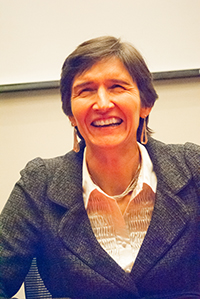 The fifth Annual Lecture in Health and Law was presented by Anna Lawson, Deputy Director of the Interdisciplinary Centre for Disability Studies, University of Leeds.
The fifth Annual Lecture in Health and Law was presented by Anna Lawson, Deputy Director of the Interdisciplinary Centre for Disability Studies, University of Leeds.
Ms Lawson's lecture reflected on the relationship between the concepts of equality and health in the disability context. It considered ways in which the demands of “health” have often been used to override those of “equality”. As well as having profound implications for the lives of disabled people, this has had significant political and theoretical repercussions. The harmful impact of neglecting the demands of equality on the health of disabled people was also considered.
The lecture concluded by a reflection on the extent to which tensions between “equality” and “health” have been resolved, and on what factors, if any, are contributing to achieving greater reconciliation. This discussion was set against the backdrop of international developments and, in particular, the United Nations Convention on the Rights of Persons with Disabilities.
This event was organized in collaboration with McGill's Centre for Human Rights and Legal Pluralism.
Évolution du droit de la procréation assistée: La bioéthique à la française
18 janvier 2012
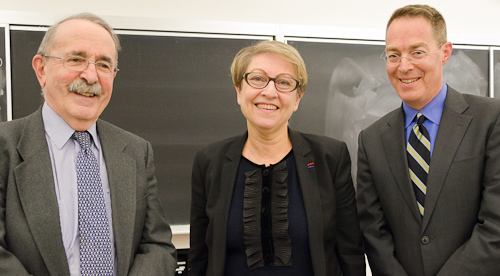
G à D: Jean-Louis Beaudoin, Frédérique Dreifuss-Netter et Nicolas Kasirer avant la conférence.
La quatrième Conférence annuelle en santé et droit s'est avérée un plein succès cette année.
La présence de Madame Frédérique Dreifuss-Netter, conseillère à la première chambre civile de la Cour de cassation en France, a attiré une centaine de personnes, un public mixte composé d’étudiants, de professeurs, d’avocats et de membres de la Cour d’appel du Québec et de la Cour supérieure.
Madame Dreifuss-Netter, en charge aujourd’hui des affaires de responsabilité médicale de la Cour, est une bioéthicienne et spécialiste du droit médical renommée en France grâce à une longue carrière universitaire précédant sa nomination à la Cour.
Après le mot d’ouverture prononcé par L’Honorable Nicholas Kasirer, Madame Dreifuss-Netter a donné une conférence impressionnante et stimulante intitulée “Évolution du droit de la procréation assistée: La bioéthique à la française”. Le mot de clôture a été prononcé par l’honorable Jean-Louis Baudouin.
Just Dying: A Discussion of Euthanasia, Assisted Suicide and the Law
13 January 2011

Jocelyn Downie, Canada Research Chair in Health Law & Policy and Professor in the Faculties of Law and Medicine at Dalhousie University, delivered a lecture on euthanasia, assisted suicide and the law on January 13, 2011.
In this talk, Jocelyn Downie reviewed the state of end of life law and policy in Canada and offered up a position on what Quebec (and other jurisdictions at various levels of government) could and should do in response to calls for the decriminalization of euthanasia and assisted suicide.
Read the article posted on Wednesday, January 26, 2011, in the McGill Reporter: Just Dying: A Discussion of Euthanasia, Assisted Suicide and the Law, by Pascal Zamprelli.
Meeting the Basic Survival Needs of the World’s Least Healthy People: Toward a Framework Convention on Global Health
25 March 2010
On March 25, 2010, the Research Group on Health and Law was proud to host Professor Lawrence Gostin (Georgetown U.), who delivered the 2nd Annual Lecture in Health and Law on how developped countries need to ensure the basic survival needs of the world’s least healthy people, and how developped countries need to ensure the basic survival needs of the world’s least healthy people. This 2nd Annual Lecture in Health and Law was sponsored in part by the McGill Beatty Memorial Lecture Series.
